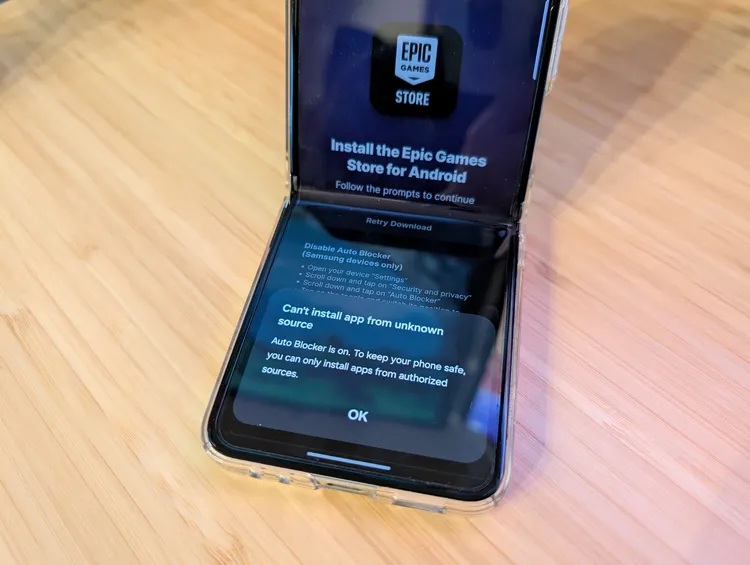Tim Sweeney claims they’re colluding to keep new app stores off Samsung phones.
Four years after taking on Google over its alleged app store monopoly—and winning—Epic Games is back in the legal ring. This time, it’s not just Google in their crosshairs. Epic is now also suing Samsung, accusing both tech giants of conspiring to suppress competition from third-party app stores. At the heart of this new battle? Samsung’s controversial “Auto Blocker” feature.
The Rise of Samsung’s Auto Blocker
Samsung’s “Auto Blocker,” which comes enabled by default on newer devices, automatically prevents users from installing apps that aren’t from what Samsung deems “authorized sources.” Spoiler: these sources are limited to Google Play and Samsung’s own Galaxy Store. According to Epic, there’s no pathway for rival app stores—like Epic’s newly launched Epic Games Store on Android—to become authorized. In other words, Samsung and Google allegedly have a stranglehold on what apps can be easily installed on their devices.

Epic’s Antitrust Allegations
Epic’s lawsuit points to the timing of Samsung’s Auto Blocker rollout as suspicious. The feature was made default just one month before the launch of the Epic Games Store on Android. For Epic CEO Tim Sweeney, this timing feels like no coincidence—an intentional move to block new competition. The complaint states that Auto Blocker now makes it so difficult to install third-party app stores that users must endure an “onerous 21-step process” to get the job done.
While Epic’s own website clarifies that turning off Auto Blocker requires just four steps, Sweeney’s point about friction holds. After testing it on his own Samsung phone, he found that not only does Auto Blocker prevent the installation of Epic’s app store, but Samsung doesn’t even make it easy to turn off the feature. The “can’t install app” pop-up offers no clear guidance on how to disable Auto Blocker. Even searching for instructions within Samsung’s own interface yields little help. Instead, users must wade through multiple screens and warnings, one of which reminds them that Auto Blocker “keeps your phone safe by blocking threats and suspicious activity.”
But Epic claims those safety warnings are misleading. According to the legal complaint, Auto Blocker doesn’t actually assess the safety or security of apps or sources before blocking them. Sweeney goes even further, claiming that the real goal isn’t security—it’s squashing competition.
No Smoking Gun—Yet
Despite these accusations, Sweeney admits Epic doesn’t yet have definitive proof of collusion between Google and Samsung. That’s why they’re suing. He’s hoping the legal discovery process will unearth the evidence needed, as it did in the original Epic v. Google case, which revealed a treasure trove of embarrassing internal communications.
What’s more, Epic hasn’t even asked Samsung if it could get its app store authorized. Sweeney claims the reason is simple: Epic isn’t just fighting for itself; it’s fighting on behalf of all developers who want to compete on a level playing field. Had Epic sought special privileges for its store alone, Sweeney argues, settlement discussions with Google and Samsung may have been more productive. But that would have meant “selling out all developers,” and Epic isn’t willing to do that.
Negotiations with Samsung Hit a Wall
Instead of asking for special treatment, Sweeney says Epic requested that Samsung either turn off Auto Blocker by default or create an honest whitelisting process where legitimate third-party apps could easily pass through the barrier. But negotiations broke down when the two companies couldn’t agree on the criteria for that whitelisting process. Epic even shared a draft of its legal complaint before finally pulling the trigger and filing the lawsuit.
Samsung, for its part, hasn’t responded to specific allegations yet. However, their support documentation notes that Auto Blocker is fully disclosed to users during the phone’s initial setup process, where they can choose to disable it if they wish. Still, many users likely won’t realize what Auto Blocker does or why it’s enabled by default.
Has Epic Really Been Harmed?
One major question remains: Has Samsung’s Auto Blocker actually hurt Epic? Sweeney says it’s too early to tell. Only two new Samsung phone models have shipped since the feature was turned on by default. He also admits that while Google’s previous attempts to obstruct third-party apps with its “Unknown Sources” warnings caused half of users to abandon their download attempts, Epic doesn’t yet have concrete data on how Auto Blocker is impacting its new app store.
That said, the Epic Games Store has seen 10 million mobile installs so far, but that’s a far cry from Sweeney’s “totally achievable” goal of 100 million by year’s end. He characterizes the store’s progress as “traction but not an enormous amount,” suggesting that more friction like Auto Blocker could seriously slow down future growth.
The Shadow of Epic v. Google
The outcome of this new lawsuit could be heavily influenced by what happens in the ongoing Epic v. Google case, where Judge James Donato is expected to issue a final order soon. If Epic prevails, the Google Play Store might be forced to carry rival app stores—including Epic’s—and grant them access to its entire app catalog. In such a scenario, Samsung’s Auto Blocker might become a less critical issue.
However, Google is almost certain to appeal, and Epic’s new lawsuit seems designed to prevent Google and its partners from engaging in what Epic calls “malicious compliance”—finding loopholes to evade court rulings. In fact, Judge Donato has hinted that he expects such tactics, telling Epic’s lawyers that if Google resorts to creative workarounds, they can always come back to court.
What’s Next?
As for whether Epic will target other companies that set up roadblocks for third-party app stores, Sweeney is noncommittal. For now, Samsung is the only company taking such measures, and Epic hopes to keep it that way. But Sweeney assures us they’re watching closely.
With Epic and Samsung now locked in this fresh legal battle, the tech industry will be keeping a close eye on how it plays out. If Epic succeeds, it could set a powerful precedent for other developers looking to challenge the dominance of the major app store players. For now, it seems the app store wars are far from over.










